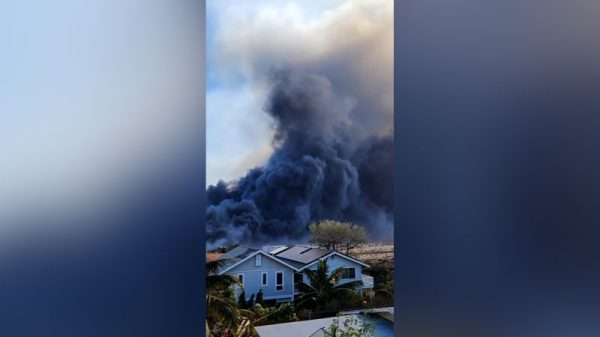The Earth’s temperature briefly rose above a crucial threshold that scientists have been warning for decades could have catastrophic and irreversible impacts on the planet and its ecosystems, data shared by a prominent climate scientist shows.
The global average temperature on Friday last week was more than 2 degrees Celsius hotter than levels before industrialization, according to preliminary data shared on X by Samantha Burgess, deputy director of the Copernicus Climate Change Service, based in Europe.
The threshold was crossed just temporarily and does not mean that the world is at a permanent state of warming above 2 degrees, but it is a symptom of a planet getting steadily hotter and hotter, and moving towards a longer-term situation where climate crisis impacts will be difficult — in some cases impossible — to reverse.
Provisional ERA5 global temperature for 17th November from @CopernicusECMWF was 1.17°C above 1991-2020 – the warmest on record.
Our best estimate is that this was the first day when global temperature was more than 2°C above 1850-1900 (or pre-industrial) levels, at 2.06°C. pic.twitter.com/jXF8oRZeip
— Dr Sam Burgess (@OceanTerra) November 19, 2023
“Our best estimate is that this was the first day when global temperature was more than 2°C above 1850-1900 (or pre-industrial) levels, at 2.06°C,” she wrote.
Burgess said in her post that global temperatures on Friday averaged 1.17 degrees above 1991-2020 levels, making it the warmest November 17 on record. But compared to pre-industrial times, before humans began burning fossil fuels on a large scale and altering the Earth’s natural climate, the temperature was 2.06 degrees warmer.
The breach of 2 degrees on Friday came two weeks before the start of the UN COP28 climate conference in Dubai, where countries will take stock of their progress towards the Paris Climate Agreement pledge to limit global warming to 2 degrees above pre-industrial levels, with an ambition of limiting it to 1.5 degrees.
Copernicus’ data is preliminary and will require weeks to be confirmed with real-life observations.
The world already looks on track to breach 1.5 degrees of warming on a longer-term basis in the next few years, a threshold beyond which scientists say humans and ecosystems will struggle to adapt.
But 1.5 is not a cliff edge for the Earth — every fraction of a degree it warms above that, the worse the impacts will be. Warming to 2 degrees puts far more of the population at risk of deadly extreme weather and increases the likelihood of the planet reaching irreversible tipping points, such as the collapse of the polar ice sheets and the mass death of coral reefs.
Richard Allan, professor of climate science at the University of Reading in the UK, called the breach a “canary in the coalmine” which “underscores the urgency of tackling greenhouse gas emissions.”
But he added that it was “entirely expected that single days will surpass 2 degrees above pre-industrial well before the actual 2 degrees Celsius target is breached over many years.”
The data comes on heels of the hottest 12 months on record, and after a year of extreme weather events, supercharged by the climate crisis, including fires in Hawaii, floods in northern Africa and storms in the Mediterranean, all of which have claimed lives.
Scientists are increasingly expressing alarm that data on temperatures are exceeding their predictions.
A string of reports checking the health of the Earth’s climate and humans’ actions to combat it in recent weeks show that the planet is careening toward a dangerous level of warming, and not doing enough to mitigate or adapt to its impacts.
A UN report last week found that even if countries enact all of their current climate pledges, planet-heating pollution in 2030 will still be 9% higher than it was in 2010. According to the Intergovernmental Panel on Climate Change, the world needs to decrease emissions by 45% by the end of this decade compared to 2010 to have any hope of limiting global warming to 1.5 degrees Celsius above pre-industrial levels. An increase of 9% means that target is way off.
Another UN report also found that the world is planning to blow the fossil fuels production limit that would keep a lid on global heating. By 2030, countries plan to produce more than twice the limit of fossil fuels that would cap warming at 1.5 degrees.







































